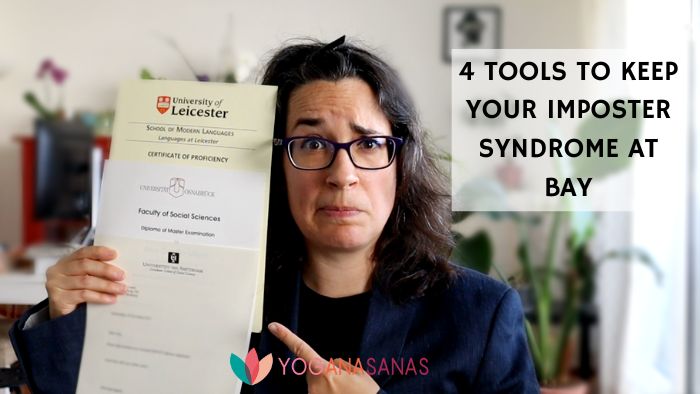Table of Contents
Four tools to keep your imposter syndrome at bay
In this video, I’m gonna show you four tools that helped me keep my imposter syndrome at bay when I was in academia.
Introduction
In 2017, I finished my PhD in England and I got a research and teaching position at the University of Amsterdam here in the Netherlands. I spent four years of my life becoming an expert on a very specific topic and I was still feeling an imposter.
In this video, I’m gonna show you four tools that help me keep my imposter syndrome at bay and that I hope it will help you overcome yours.
According to the research of Bravata and Valerie Young, approximately 82% of people have felt an imposter at least once in their life. What is interesting is that these 82 % includes executive CEOs, astronauts, Prime Ministers or any really self-confident super fashionable person that you may think of.
What is exactly the imposter syndrome?
The Imposter syndrome is the persistent inability to believe that one’s success is deserved or has been legitimately achieved as a result of one’s own efforts or skills.
Basically, that regardless of what you achieve in your career or in life you still feel that it was something that came by pure chance… that you didn’t really earn it. That it just happened.
In my case, it wasn’t until 2017 that I got this postdoc position at the University of Amsterdam that I heard the term imposter syndrome.
My experience feeling an imposter
Honestly, it feels a little bit surreal that I spent four years of my life working on a specific topic, becoming an expert, attending conferences, analyzing data at a European level and that not even that helped me overcome the Imposter syndrome that I was experiencing.
The thing is that at some point I didn’t share with others that I was feeling an imposter because when I shared it the reaction that I typically got was:
-“Oh that’s okay, it’s normal.”
-“I understand it… it happens that you’re nervous.”
-“It will just go away”
But honestly, sometimes it doesn’t go away.
The imposter syndrome sometimes lingers and lingers. In my case, I had it for so long that I had internalized that it was part of my personality. It was part of who I was.
A key lesson
One thing that really helped me shift my relationship towards the imposter syndrome was to realize that my emotions were valid but just because I was feeling an imposter I was not an imposter.
These emotions did not necessarily reflect my identity, nor did they reflect who I was or who I am.
Over time, I learned that people who experience the imposter syndrome tend to experience high levels of anxiety, they are quite the perfectionist type, and they are also very afraid of failure. In other words: they don’t take well making mistakes. I mean… who doesn’t, right?
Learning these three traits was huge and it made such a difference on me. The imposter syndrome was something that it was really hard to explain, and very abstract. However, with these three traits I was actually able to see it as something concrete and feasible to tackle.
With these three traits in mind, here are the four tools that I use to counteract these qualities.
First tool: fail on purpose
The first tool: fail on purpose. You may try several things. For instance, draw something complicated, something that feels really hard. Or try a new dance move (like the moonwalk) for the first time.
Don’t worry about the results, just do something that makes you feel a little bit uncomfortable and see what happens.
Second tool: practice compassion on a daily basis
Tool number two: practice compassion on a daily basis. If you are really hard on yourself (like I am), practicing compassion might sound a little bit cheesy a little bit gooey. But, believe me, compassion doesn’t mean that you need to hug yourself or everyone on a daily basis. Not at all.
In my case, practicing compassion means that I usually ask myself on a daily basis: “have I done the best today?” And, listen, when I say the best, I don’t mean that I did perfectly. Of course not! I’m a human being.
But doing my best means that I have integrated whatever I had with me and I still gave everything I could to the situation. I showed up fully… with my weaknesses, with my strengths, with my smile and with my tears.
Third tool: honour your progress
Tool number three: honour your daily progress. Focus on the process and not so much on the outcome.
Having an outcome, a goal is definitely important. But while you’re working on a project, you are spending most of your time on the process. On the little achievements, the steps you’re taking that move you closer to that goal. You don’t spend that much time on the actual outcome.
Most of the times, when the outcome is achieved, we don’t even feel content. We tend to feel anxious knowing that something else is around the corner. On top of this, projects sometimes work but sometimes projects don’t work out.
So, regardless of the outcome, wouldn’t it be much nicer and healthier to focus on the process as it comes? It’s really worth giving this a go and trying to focus on the present. Try and notice what happens when you focus on the process and not so much on the outcome.
Fourth tool: practice mindfulness
Research shows that mindfulness can really help cope with the stress and anxiety and if you experience the imposter syndrome frequently, I’m pretty sure that you also have high levels of stress and anxiety. So, if that’s the case mindfulness is a great thing to give it a go.
And when I say practice mindfulness, I don’t expect nor do I mean sitting for one hour or 30 minutes not even 10 minutes. Sometimes five or one minute is all you’ve got. If that’s the case, that’s more than enough to help you establish this practice.
Free mindfulness meditations
If you would like to practice mindfulness and you don’t know where to start or how to do it I have three meditations that you can download for free they’re very short and they’re great for you to practice at work or when you have a break and you need some time to reset.
I’ll leave the link to them below.
Conclusion
In this article, I explain what are the main traits that I notice in my imposter syndrome experience, and these four tools that I have used to keep my imposter syndrome at bay.
Have you ever tried any of those? Or if you haven’t… how do they sound?
Let me know down below in the comments and I hope to see you very soon!







0 comentarios